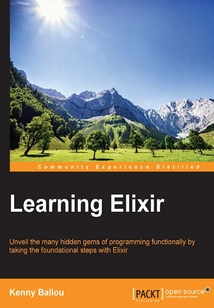舉報 

會員
Learning Elixir
最新章節:
Index
ThisbooktargetsdevelopersnewtoElixir,aswellasErlang,inordertomakethemfeelcomfortableinfunctionalprogrammingwithElixir,thusenablingthemtodevelopmorescalableandfault-tolerantapplications.AlthoughnoknowledgeofElixirisassumed,someprogrammingexperiencewithmainstreamObject-OrientedprogramminglanguagessuchaRuby,Python,Java,C#wouldbebeneficial.
目錄(85章)
倒序
- 封面
- 版權頁
- Credits
- About the Author
- About the Reviewers
- www.PacktPub.com
- Support files eBooks discount offers and more
- Preface
- What this book covers
- What you need for this book
- Who this book is for
- Conventions
- Reader feedback
- Customer support
- Chapter 1. Introducing Elixir – Thinking Functionally
- Why functional?
- Installing Elixir
- Hello World!
- Exercises
- Summary
- Chapter 2. Elixir Basics – Foundational Steps toward Functional Programming
- Everything is an expression
- A short introduction to types
- Invariable variables and pattern matching
- Elixir structure
- Elixir files
- Exercises
- Summary
- Chapter 3. Modules and Functions – Creating Functional Building Blocks
- Modules
- Anonymous functions
- Named functions
- Calling functions
- Grabbing functions
- When patterns aren't enough for matching
- Functional algorithms for everyday problems
- Mix – the ladle of Elixir
- Building functional projects
- More to do about modules
- Testing with comments
- Exercises
- Summary
- Chapter 4. Collections and Stream Processing
- Keywords maps and dictionaries
- Flow-based programming
- Stream processing and Elixir
- Exercises
- Summary
- Chapter 5. Control Flow – Occasionally You Need to Branch
- Branching with Elixir
- Examples using branching
- Exception handling
- Determinism
- References
- Exercises
- Summary
- Chapter 6. Concurrent Programming – Using Processes to Conquer Concurrency
- Parallel computation and concurrent computation
- Erlang processes and OS processes
- Basics of Elixir process
- Applications
- Summary
- Chapter 7. OTP – A Poor Name for a Rich Framework
- Applications
- Gen(eric) behaviours
- Supervisors
- Exercises
- Summary
- Chapter 8. Distributed Elixir – Taking Concurrency to the Next Node
- Obligatory discussion about distributed computing
- Another short discussion about networks
- Distributed computing with Elixir
- Summary
- Chapter 9. Metaprogramming – Doing More with Less
- Behaviours and protocols
- Abstract syntax trees
- Our first macros
- Context and macro hygiene
- Macro examples
- Domain-specific languages
- With great power...
- Exercises
- Summary
- Going forward
- Index 更新時間:2021-07-23 14:48:05
推薦閱讀
- 精通Nginx(第2版)
- CockroachDB權威指南
- Python爬蟲開發:從入門到實戰(微課版)
- Internet of Things with the Arduino Yún
- concrete5 Cookbook
- SAP BusinessObjects Dashboards 4.1 Cookbook
- UVM實戰
- 深入實踐Kotlin元編程
- 零代碼實戰:企業級應用搭建與案例詳解
- Python趣味編程與精彩實例
- 遠方:兩位持續創業者的點滴思考
- 深入淺出 HTTPS:從原理到實戰
- Learning Dynamics NAV Patterns
- Python實戰指南:手把手教你掌握300個精彩案例
- Neo4j權威指南 (圖數據庫技術叢書)
- Serverless從入門到進階:架構、原理與實踐
- App Inventor開發實戰
- 計算機邏輯設計
- Microsoft 365 and SharePoint Online Cookbook
- Python金融風控策略實踐
- Visual C++從入門到精通(第5版)
- 機器學習入門:Python語言實現
- Introduction to JVM Languages
- iOS Game Development By Example
- Python數據分析案例實戰(慕課版)
- Microsoft Tabular Modeling Cookbook
- SproutCore Web Application Development
- HTML5 Data and Services Cookbook
- Java語言程序設計(第3版)
- Power BI數據分析:報表設計和數據可視化應用大全

